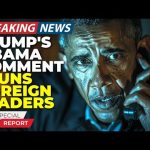In a recent interview, President Trump made quite a splash by proclaiming that he has lined up a staggering 200 trade deals to be announced shortly. While the specifics of these agreements remain a mystery for now, the President assured the public that they will be rolled out within three to four weeks. He likened the U.S. trade situation to a bustling store where he sets the prices. The message was clear: if other countries want to shop at the American market, they need to pay the price he determines.
The President’s comments came alongside a pause in tariffs on goods entering the United States, a move that has sparked conversations about international trade dynamics. His administration is reportedly in productive discussions with South Korea and is gearing up for more technical negotiations soon. Meanwhile, talks with China are ongoing, although not without their complications. There are concerns about China’s recent decision to stop purchasing U.S. pork, a move that could significantly impact American farmers.
In the interview, Trump also expressed frustration over China’s rejection of Boeing planes, stating it was perplexing that they would send the aircraft back. It seems that both nations are at an impasse, as neither side appears willing to make substantial concessions. Interestingly, China has quietly rolled back some of the retaliatory tariffs on U.S.-made semiconductors, indicating that there could be some wiggle room in their negotiations. The markets are on standby, eagerly waiting to see how these trade deals will unfold, especially with China.
The discussions about tariffs and trade agreements have sparked a broad range of topics, including the President’s willingness to engage with various parties, regardless of past criticisms. His approach is characterized as “radical transparency,” which aims to foster open communication between leaders and the media. This is somewhat refreshing in a world where political figures often shy away from tough questions. Trump’s administration seems determined to tackle these trade challenges head-on, asserting that losing money on trade is not an option any longer.
The buzz about the impending deals includes a focus on how these agreements will benefit American businesses and consumers. For instance, Walmart and other big retailers have noted that they have not lost business as a result of tariffs because many of their products are made domestically. This suggests that the “big beautiful store” metaphor might extend to preserving American jobs and boosting the economy. As Trump prepares to unveil a series of trade deals, he is undoubtedly trying to lay the groundwork for a prosperous America that competes on the global stage without compromising its core values.




